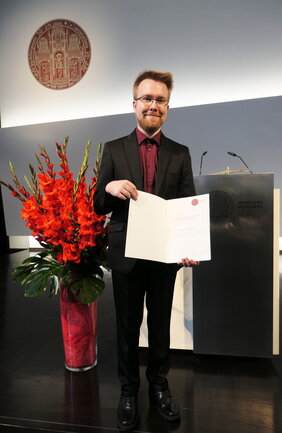Each year the Klaus-Georg and Sigrid Hengstberger Award enables up to three young scientists at Heidelberg University to organize their own dedicated symposium. This year, Dr Andreas Sander, Emmy Noether Junior Research Group Leader at the Astronomisches Rechen-Institut (ARI) of the Center for Astronomy of Heidelberg University, is one of the awardees. The award has a value of 12.500 Euro and will support the organization of a scientific symposium at the Heidelberg International Science Forum (IWH) about the yields of massive stars and their impact on the chemical evolution of galaxies.
Dr Sander employs novel computational methods to explore the role of massive stars in the evolution of the Universe. Owing to their high luminosity, massive stars dominate their surrounding with their strong stellar winds and ionizing radiation. The scientific efforts of his research group revolve around the quantification and theoretical understanding of this impact by applying and developing expanding stellar atmosphere models. A key ingredient in the role of massive stars as fundamental engines of the cosmic matter cycle are their strong, radiation-driven winds, which e.g. need to be accounted for in the quantitative spectral analysis and simulation of these objects.
In his symposium, Dr Sander and his group will investigate the broadercontext of stellar yields from massive stars by combining their research insights on stellar winds with complementary expertise from other related astrophysical disciplines, e.g. stellar evolution modelling and supernovae explosions. A particular aim of the symposium, which will take place in September 4-8, 2023, is to pave the way for a more realistic understanding and quantification of the origin of our elements.
Andreas Sander earned his diploma in physics in 2010 at the University of Potsdam where he also obtained his doctorate in the field of astrophysics in 2016. As a postdoctoral researcher he laid the basis for a new generation of stellar atmosphere models and expanded his expertise on the theoretical foundations of stellar winds. After holding an independent fellowship at Armagh Observatory in the UK, he started his Emmy Noether research group in August 2021 at the ARI in Heidelberg.
Dr. Sander formally received the Klaus-Georg and Sigrid Hengstberger Award from Prof. Dr. Dr. h.c. Bernhard Eitel, Rector of Heidelberg University, during the university's annual celebration on October 22, 2022.
Background information
- Personal Website of Dr Sander's group
- Since 2004, up to three Klaus-Georg and Sigrid Hengstberger awards are annually granted to young scientists and researchers of the Ruprecht-Karls-Universität Heidelberg. The awards are intended to enable the awardees organize a scientific symposium “The Ruperto Carola Symposium at the IWH: A Sponsorship Award for Young Scientists.” A sum of 12.500 Euros is awarded to each of the three selected projects. The award is aimed at scientists, researchers or scholars working in any academic discipline, be it natural sciences and medicine or humanities and social sciences. The award ceremony for the Klaus-Georg and Sigrid Hengstberger Award takes place during the anniversary celebrations ("Jahresfeier") of the Ruprecht-Karls-University.The
- The International Academic Forum Heidelberg (IWR) is an interdisciplinary centre for scholarly exchange in academia. As a vital organ and think tank of the Heidelberg University it has been providing a platform for multidisciplinary intellectual engagement for over three decades. Since its inauguration on April 12th 1986, more than 2000 symposiums, workshops, seminars and conferences have convened at the International Academic Forum. The IWH is a research facility of Heidelberg University. For more information see www.uni-heidelberg.de/einrichtungen/iwh/index_engl.html.

